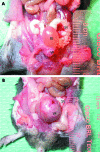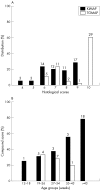Application of Gleason analogous grading system and flow cytometry DNA analysis in a novel knock-in mouse prostate cancer model
- PMID: 16397079
- PMCID: PMC2563736
- DOI: 10.1136/pgmj.2005.038042
Application of Gleason analogous grading system and flow cytometry DNA analysis in a novel knock-in mouse prostate cancer model
Abstract
Objective: A new knock-in mouse adenocarcinoma prostate model (KIMAP) was established, which showed a close to human kinetics of tumour development. This study used a new mouse histological grading system similar to the human Gleason grading system and flow cytometry DNA analysis to measure and compare the new KIMAP model with human CaP and transgenic mouse adenocarcinoma prostate (TGMAP) model.
Methods: According to heterogeneity of the clinical standard for prostate cancer diagnosis, a close to human mouse standard for histological grading and scoring system, Gleason analogous grading system, was established in this study. Sixty KIMAP and 48 TGMAP prostate cancer samples were measured and compared with human CaP. Flow cytometry DNA analysis was performed on malignant prostate tissues obtained from both TGMAP and KIMAP models.
Results: Mice with CaP from KIMAP (n = 60) and TGMAP (n = 48) models showed a different distribution of histological scores (p = 0.000). KIMAP mice showed higher percentage (53.3%) of compound histological score rate than TGMAP (25%), but closer to the human clinical average (50%), which showed significant correlation with age (p = 0.001), while TGMAP mice showed unbalanced and random score distribution in all age groups. Flow cytometry analyses showed that most tumour tissues in KIMAP were diploid, analogous to the human condition, while all the TGMAP mice showed aneuploid tumours.
Conclusions: Results of this study further show that KIMAP, a new generation of murine prostate cancer model, could be used as a supplementary model in addition to the currently widely used transgenic models.
Conflict of interest statement
Conflict of interests: G J Wu has been paid by the Fourth Military Medical University for running educational programmes and financial support for attendance at scientific meetings.
References
-
- Abate‐Shen C, Shen M M. Mouse models of prostate carcinogenesis. Trends Genet 200218S1–S5. - PubMed
-
- Huss W J, Maddison L A, Greenberg N M. Autochthonous mouse models for prostate cancer: past, present and future. Semin.Cancer Biol 200111245–260. - PubMed
-
- Winter S F, Cooper A B, Greenberg N M. Models of metastatic prostate cancer: a transgenic perspective. Prostate Cancer Prostatic Dis 20036204–211. - PubMed
-
- Killion J J, Radinsky R, Fidler I J. Orthotopic models are necessary to predict therapy of transplantable tumours in mice. Cancer Metastasis Rev 199817279–284. - PubMed
Publication types
MeSH terms
Substances
LinkOut - more resources
Full Text Sources
Medical
Molecular Biology Databases
Miscellaneous






